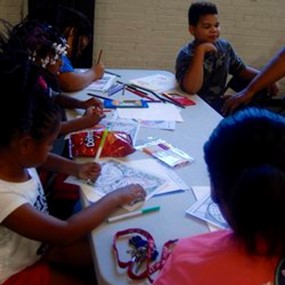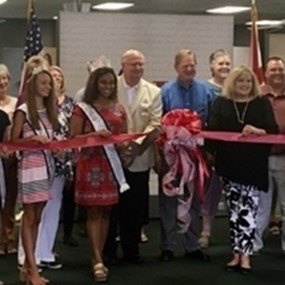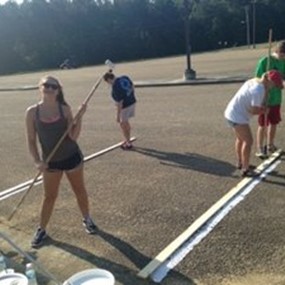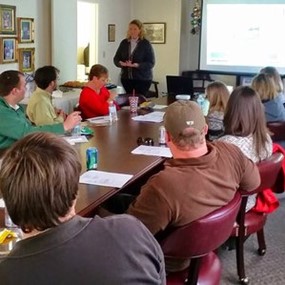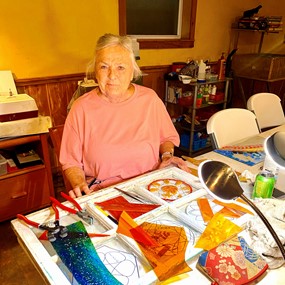Dealing with death in a small town
Living Democracy is an invitation for students to understand life in a small town. But what about when life ends? An informal group of people in Elba and Coffee County are dedicated to the care of their fellow citizens who help at the end of life, from the time of death to burial or cremation.
Often these people work independently of one another, but all have similar goals:
1) Be available.
2) Be professional.
3) Be helpful.
When someone passes away in Coffee County, the first person to work with the deceased and their family is usually Coffee County Coroner Robert Preachers. When someone dies unexpectedly in Coffee County, Preachers is called to the scene to help certify the cause of death, fill out the death certificate and inform the deceased's family about what happened.
In fact, he prides himself on how fast he can respond to a call. "If I get a call, I can get in a shower and then be at the scene in ten minutes," Preachers said.
The speed Preachers is proud of seems to be related to the reason he first decided to run for coroner. In 2002, Preachers had a friend commit suicide, and his body was not recovered in a timely manner.
Within a year Preachers was elected to a four-year term as coroner. He won reelection in 2006, 2014 and 2018–serving for nearly 15 years nonconsecutively. His main pitch to voters was that he served in law enforcement for 20 years, worked as a volunteer firefighter and served in the National Guard's disaster relief team.
His experience with disaster and trauma seems to have had a lasting impact on how Preachers approaches his job as coroner. "When I come home, I throw the files on my desk and then forget about the day," he said. "I've been to training and know how to handle grief and death."
However, Preachers' experienced, firm voice still shook when talking about the deaths of children. "The kids are the hardest part," he said. "Even the teenagers don't know what life is about yet. They're just trying to figure it out, and they don't get the chance."
Regardless of the job's hardships, Preachers said he plans to continue running for reelection as long as he feels he is physically able to do the job.
Following any investigations into the cause of a person's death, the next step is for the family to arrange a funeral.
Hayes Funeral Home, the oldest funeral home in Elba, has been helping families cope with loss and burial arrangements since 1934. "I devoted a lifetime to it," said Charles P. Hayes III, the son of the founder of the funeral home.
Hayes, 80, started working at the family funeral home in 1960. Over the past 60 years, Hayes said the funeral business has changed drastically.
"It used to be, in the 60s and the 50s and the 40s, the funeral homes were in old home structures," Hayes said. "All of that has gone by the way as people became more sophisticated."
According to Hayes, that change has been beneficial to both funeral homes and the grieving families. "People learned that instead of beating themselves up, they would try to make this as easy as they could," he said. "It is simpler to handle it all through the funeral director and the funeral home."
Hayes now runs the funeral home with Ronald Marrow and Heath Wyrosdick.
"I lost my father in '94, and I was getting ready to graduate high school," Wyrosdick said. "While I was making his funeral arrangements, I mentioned to [Hayes] that I was about to graduate and thought I might be interested in this as a career."
Both Wyrosdick and Hayes said they do take their jobs home with them.
"You gain relationships with these families, and just when this funeral is over—when we say 'amen'—it's not over for us either," Wyrosdick said. "You go home, you lay down at night, and your day's not over. You think about them and what they are going through and what you can do to provide some means of comfort. That's the hardest part emotionally."
Like Preachers, Hayes said dealing with the deaths of children is the hardest part.
Both are also aware that most people are not excited to have to do business with them.
"Nobody wants to talk about [death], nobody wants to think about it, but it come to every family eventually," Wyrosdick said. Nevertheless, Hayes and Wyrosdick said they felt called to be a funeral director.
"A funeral director is a special breed," Hayes said. "It's a calling, like the ministry is a calling. My job and my duty and my people come ahead of my family."
A small town's sense of knowing everybody doesn't stop with death either.
"We don't bury anyone but friends and family," Wyrosdick said. "We worship with these people at church, we see them at the post office, we buy groceries with them at the grocery store. They count on us."
That's the strongest sentiment that comes from these professionals. They know this an industry where planning ahead is difficult, where emotions are inevitable and where many of the jobs are unenviable.
And they do it anyway. Life in a small town is different—so is death.
Tags: Elba
